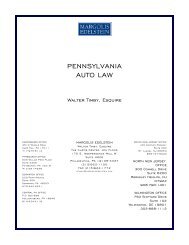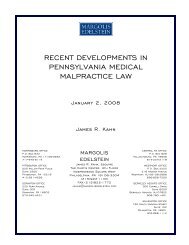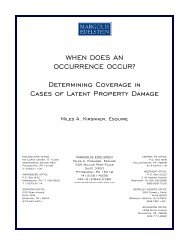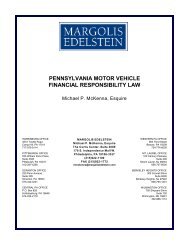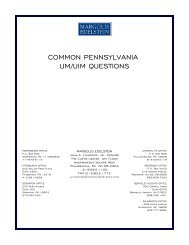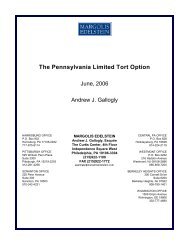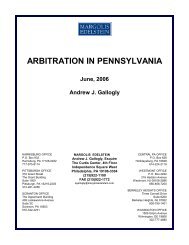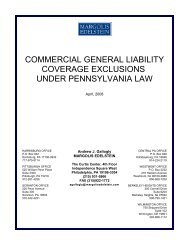selected topics in pennsylvania legal malpractice law - Margolis ...
selected topics in pennsylvania legal malpractice law - Margolis ...
selected topics in pennsylvania legal malpractice law - Margolis ...
Create successful ePaper yourself
Turn your PDF publications into a flip-book with our unique Google optimized e-Paper software.
EXPERT TESTIMONY<br />
Expert testimony is generally required <strong>in</strong> <strong>legal</strong> <strong>malpractice</strong> cases unless the issue is so simple<br />
or the lack of skill or want of care is so obvious as to be with<strong>in</strong> the range of an ord<strong>in</strong>ary layperson’s<br />
experience and comprehension. Rizzo v. Ha<strong>in</strong>es, 520 Pa. 484 n.10, 555 A. 2d 58 n.10 (1989)<br />
(<strong>in</strong>volv<strong>in</strong>g funds borrowed from client’s <strong>law</strong>suit recovery). In a <strong>legal</strong> <strong>malpractice</strong> action the<br />
question of whether expert testimony is required depends on whether the issue of negligence is<br />
sufficiently clear so lay persons could understand and determ<strong>in</strong>e the outcome , or whether the<br />
alleged breach of duty <strong>in</strong>volves complex <strong>legal</strong> issues which require expert testimony to amplify and<br />
expla<strong>in</strong> it for the factf<strong>in</strong>der. Storm v. Golden, 538 A.2d 61 (Pa. Super. 1988). A <strong>legal</strong> <strong>malpractice</strong><br />
action that alleges breach of contract requires expert testimony when the assumpsit claims are not<br />
true contract causes of action but sound <strong>in</strong> negligence by alleg<strong>in</strong>g an attorney failed to exercise the<br />
appropriate standard of care. Storm, supra. The requirement for expert testimony is the same <strong>in</strong><br />
bench trials as it is for jury trials. Lent<strong>in</strong>o v. Fr<strong>in</strong>ge Emp. Plans, Inc., 611 F.2d 474 (3d Cir.1979).<br />
The court believed the standard of care itself was a question of fact best left to presentation of<br />
evidence with cross-exam<strong>in</strong>ation and rebuttal.<br />
The Pennsylvania Rules of Civil Procedure 1042.1 to 1042.8 govern claims aga<strong>in</strong>st <strong>legal</strong><br />
professionals and require that a certificate of merit be filed by the claimant’s attorney to support the<br />
<strong>legal</strong> <strong>malpractice</strong> action. This certificate requirement applies to “any action based upon an allegation<br />
that a licensed professional deviated from an acceptable professional standard.” Under Pa.R.C.P.<br />
1042.3, the certificate must be filed with<strong>in</strong> 60 days of the compla<strong>in</strong>t and certify the follow<strong>in</strong>g:<br />
(1) an appropriate licensed professional has supplied a written statement that<br />
there exists a reasonable probability that the care, skill or knowledge exercised or<br />
exhibited <strong>in</strong> the treatment, practice or work that is the subject of the compla<strong>in</strong>t, fell<br />
outside acceptable professional standards and that such conduct was a cause <strong>in</strong><br />
br<strong>in</strong>g<strong>in</strong>g about the harm, or<br />
(2) the claim that the defendant deviated from an acceptable professional<br />
standard is based solely on allegations that other licensed professionals for whom this<br />
defendant is responsible deviated from an acceptable professional standard, or<br />
(3) expert testimony of an appropriate licensed professional is unnecessary for<br />
prosecution of the claim.<br />
This rule applies to claims aga<strong>in</strong>st the attorney by his client which assert as their basis<br />
a breach of professional standards. Where the attorney is sued when represent<strong>in</strong>g an adverse party<br />
<strong>in</strong> a transaction, and not the pla<strong>in</strong>tiff, such as where the attorney represents a seller of property and<br />
is sued by the buyer for tortious <strong>in</strong>terference with contract, negligent misrepresentation, <strong>in</strong>tentional<br />
misrepresentation, promissory estoppel and equitable estoppel, then Rule 1042.3 does not apply.<br />
Krauss v. Claar, 879 A. 2d 302 (Pa. Super. 2005). A certificate is not required for a Wrongful<br />
Use of Civil Proceed<strong>in</strong>gs claim. Sabella v. Estate of Milides, 992 A. 2d 180 (Pa. Super. 2010).<br />
-9-



